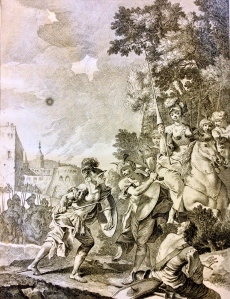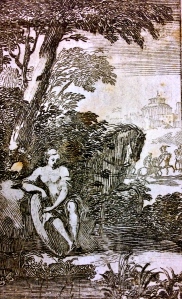We shall now leave Rinaldo to his as yet unknown fate, and turn to another young (and purely fictional) character in the story. Erminia is a young and beautiful girl, a blonde and on the Muslim camp – all three major female characters are, an intriguing fact which will be discussed later – who is a guest of King Aladdin.
Erminia joins him, at his invitation, / Erminia fair, who to his court did fly, / by Christian armies ousted from her reign / of Antioch, the king her father slain. (3.12)
From above the walls of Jerusalem, Aladdin is watching a battle raging between his own men, led by Clorinda, and the Christians led by a most gallant and fierce knight. In a scene reminiscent of Homer’s Iliad (Helen formerly of Sparta and now of Troy does the same, pointing out various Greek heroes to the Trojans), Aladdin asks Erminia who that man is; she knows the names of all the main Christian knights from the siege of her own city, This is her answer:
He is Prince Tancred. Would that he were mine / one day, my captive – and not dead, for I / want him alive that I may wreak a fine / vengeance on him and slake my rage thereby.
She is only telling half the truth, and her words are at best ambivalent, for she is really deeply in love with Tancred, who treated her with courtesy, and honoured her like a queen after Antioch fell to the Christian’s siege. In the end, he granted her her freedom plus all her personal jewellery and treasures. How could she not love him? But Tancred is in love with Clorinda. And Clorinda is a good friend of Erminia’s. And Erminia knows nothing of this love – and to be fair, neither does Clorinda, at first.
In Canto Six, Tancred is to fight in single combat with the major Muslim warrior, Argant. The two warriors are equally fierce and strong, and the event cannot be concluded in just one day. Argant is injured, but not seriously, and so is Tancred. Erminia wishes to go to Tancred and heal him with her arts; because, of course, she is a little bit of a witch, too:
And since she by her mother had been taught / the secret virtues in all growing things, / and all that might through magic spells be wrought / to close a wound and soothe the pangs it brings / (lore which the custom of that country thought / fit for the noble daughters of its kings) …. / She yearns to nurse her lover, and to choose / some condign(1) way to serve his enemy / perhaps with noisome herb or cursed juice / to sprinkle him and poison him thereby. (6.67-8)
Erminia is reluctant to use such dark arts, although she yearns to heal Tancred. She debates the question of whether she should go to him for a while, but finally vain hopes and foolish daydreams of becoming his wife lead her to make a big decision: she will abandon Jerusalem and try to sneak into the Christian camp and inside Tancred’s tent. But how will she leave the city, whose gates are so scrupulously locked and guarded?
Erminia is not brave: she is the opposite of Clorinda, in many ways. A girly girl, she has only got time for love and for spending time with her dear friend, to whom she confides all her secrets – they often share the same bed and keep chatting till the morning, as girl friends will do – except the one that concerns Tancred. Erminia has free access to Clorinda’s room and things, and decides to dress up in her martial friend’s suit of mail, and thus disguised leave the city. At that moment, Erminia realises that perhaps it is better to be a warrior maiden than a cosseted princess:
How I envy her lot – not for her glory’s glow / nor for her beauty (womanish vanity), / but that no long gown clogs her steps / and no envious bower cramps her heart, / for she girds on her arms when exploits are her aim, / and rides out unrestrained by fear or shame. (6.82)
Eventually she squeezes herself into Clorinda’s armour and, feeling extremely uncomfortable and slightly ridiculous, for she soon realises that ‘the habit does not the priest make,’ she leaves the security of the city walls for the hostile world outside.

Erminia in Clorinda’s clothes flees Jerusalem, by Giambatista Piazzetta. Sp Coll Hunterian Cd.2.1., Special Collections, University of Glasgow Library.
Her plan goes all awry: not only cannot she walk – much less swagger like a true warrior maiden – in the hot and heavy armour, but she is mistaken for Clorinda by a Christian knight whose whole family had been exterminated by her only that morning! Her maid and squire, who had been accompanying her all along, as befits a girl of noble family, flee, and her horse carries her to a nearby ancient forest, where she is lost and wanders all alone, crying and calling for help, but alas, to no avail…
In the end, after a night and a day wandering, scared and lonely and desperate, she comes across an idyllic scene: a family of poor but happy fishermen and shepherds, braiding baskets and playing the woodland whistles and singing. They take her in for a while, offering hospitality and friendship, and in a turn very common to romance, Erminia the princess is transformed for a while into a shepherdess.
The pastoral idyll, a very ancient tradition in romance (‘Dafnis and Chloe’ is the archetype for this genre, written in the 2nd century) was having a comeback in the late Renaissance, and Tasso himself wrote one of the most famous pastorals of all time, Aminta. Why did he choose to insert this sort of adventure in the midst of all the drama of war? Perhaps as a respite, or to gently remind the readers of his other work. The story of Erminia is not finished here though: more is in store for her as the affairs of Christians and ‘pagans’ take a more dramatic turn soon.
(1) condign: fitting and deserved, esp. as punishment or retribution.

